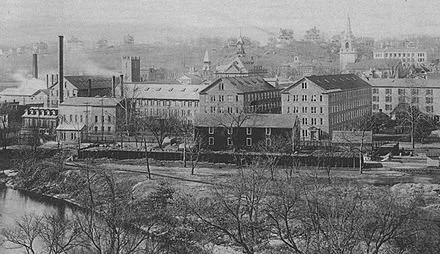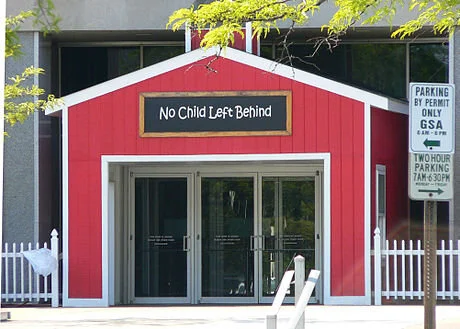
Revolutionary coverings
“Lil Glory’’ (fabric, polyester fill, fringe), by Natalie Baxter, in the show “Stiching the Revolution: Quilts as Agents of Change,’’ at the Mattatuck Museum, Waterbury, Conn., opening May 19.
The show presents about 30 quilts from the museum’s collection, and loans from other New England institutions and contemporary artists. The exhibition pairs historic and modern quilts spanning over 200 years of production viewed as pivotal mediums that express potent beliefs and inspire important change.
Waterbury skyline from the west, with Union Station clock tower at left. The city was once known as the brass and clock / watch capital of America. New England Diary’s editor, Robert Whitcomb, lived near Waterbury in 1962-66 and remembers the many factories still open, the toxic pollution of the Naugatuck River, which flowed through the city, and the necessity of walking up and down steep hills.
Noble nectar
The Truro Vineyards in North Truro, Mass.
— Photo by Caliga10
"Behold the rain which descends from heaven upon our vineyards, and which incorporates itself with the grapes to be changed into wine; a constant proof that God loves us, and loves to see us happy."
— Benjamin Franklin (1706-1790), American founding father, scientist, inventor and businessman. He grew up in Boston. Apparently, contrary to the old story, he never cited beer as proof that God loves us. We briefly fell into that error here.
Amazon octopus keep stretching out its arms
Goodyear Metallic Rubber Shoe Company and downtown Naugatuck (c. 1890). The many industrial firms in Naugatuck and Waterbury in the communities’ industrial heyday, from the mid-19th Century through the 1960’s, dumped toxic waste into the Naugatuck River, much of which eventually flowed into Long Island Sound.
From The New England Council (newenglandcouncil.com):
“Amazon plans to develop a new distribution facility in New Haven County, Conn….Bluewater Property Group, a developer from Pennsylvania, has begun taking steps to create a tremendous Amazon distribution facility on the border of Waterbury and Naugatuck.
“Though the development is far from completion and is awaiting approval, residents of Waterbury and Naugatuck and members of the Connecticut (congressional) delegation are optimistic about the prosperity that this facility would bring to the county, and even the state.
“‘It has the potential to create up to 1,000 new jobs and go a long way in supporting these communities in their broader revitalization efforts,’ stated Connecticut Gov. Ned Lamont. U.S. Rep. Jahana Hayes shared in this assertion, stating that this influx of jobs would benefit the middle class and the blue-collar workers in the area.’’
Chris Powell: Beware 'regulatory capture' of appointees to Cabinet
MANCHESTER, Conn.
Many teachers around the country are cheering the forthcoming change in national administration because Betsy DeVos will be replaced as secretary of education. DeVos, an heiress and philanthropist, has been a fan of charter schools and a foe of political correctness. While not really expert in pedagogy, at least she has not been the usual tool of teacher unions.
But President-elect Joe Biden is encouraging teachers to expect Nirvana. Addressing them the other week, Biden noted that his wife, Jill, is a community college teacher, and so "you're going to have one of your own in the White House." Presumably that means that teachers will have "one of their own" at the Education Department as well.
Among those mentioned is U.S. Rep. Jahana Hayes, the former Waterbury teacher and 2016 national teacher of the year, a Democrat who was just elected to her second term in Connecticut's 5th Congressional District.
Apart from her classroom work, Hayes has no managerial experience and her first term in Congress was unremarkable. Her recent campaign's television commercials celebrated her merely for listening to her constituents. While she won comfortably enough in a competitive district in a Democratic year, her departure for the Cabinet would prompt a special election that the Democrats might lose even as they already are distressed by the unexpected shrinkage of their majority in the U.S. House.
But then the U.S. Education Department does little to improve education. Mainly it distributes federal money to state and municipal governments, which do the actual educating. No matter who becomes education secretary, money will still get distributed and education won't improve much if at all.
Quite apart from the personalities, the big issue about the appointment of an education secretary is the big issue with other federal department heads. Why should the public cheer the appointment of an education secretary who is part of the interest group he would be regulating, any more than the public should cheer another Treasury secretary coming from a Wall Street investment bank, another labor secretary coming from a labor union, another defense secretary coming from the military or a military contractor, another agriculture secretary coming from agribusiness, and so yforth?
This kind of thing is called "regulatory capture" and it operates under both parties, though some special interests do better under one party than the other, as the cheering from the teacher unions indicates.
xxx
The virus epidemic has invited a comprehensive reconsideration of education but no one in authority has noticed.
Every day brings a change of plan and schedule in Connecticut schools. One day they're open and the next day they are abruptly converted to "remote learning" for a few days, a week or two, or a whole semester because somebody came down with the flu.
Amid all this many students have simply disappeared. Additionally, since education includes not just book learning but the socialization of children, their learning how to behave with others, the education of all children is being badly compromised.
Gov. Ned Lamont wants to leave school scheduling to schools themselves. This lets him avoid responsibility for any school's policy. But local option isn't producing much education.
The hard choice everyone is trying to avoid is between keeping schools open as normal, taking the risk of more virus infections because children are less susceptible to serious cases, or converting entirely to internet schooling and thereby forfeiting education for the missing students and socialization for everyone else.
If social contact can be forfeited, the expense of education can be drastically reduced. The curriculum for each grade can be standardized, recorded, and placed on the internet, with students connecting from home at any time, not just during regular school hours. Tests to evaluate their learning can be standardized too and administered and graded by computer. A corps of teachers can operate a help desk via internet, telephone, or email.
Much would be lost but then much already had been lost even before the epidemic, since social promotion was already the state's main education policy. Maybe the results of completely remote schooling would not be so different from those of social promotion.
Chris Powell is a columnist for the Journal Inquirer, in Manchester.
Pay the companies bribes AFTER they create jobs?
Waterbury, Conn., once famous for the manufacture of brass products, clocks and watches. But as with all of the state’s cities, most manufacturing has departed, taking a lot of well-paying blue-collar jobs with it. The train station’s Italianate tower is at the left.
From Robert Whitcomb’s “Digital Diary,’’ in GoLocal24.com
David Lehman (perhaps unfortunately a former Goldman Sachs partner) has some interesting ideas about how to boost still rich Connecticut’s economy and, particularly, how to lift its troubled cities. Gov. Ned Lamont, a Democrat, has named Mr. Lehman to be commissioner of the Nutmeg State’s Department of Economic and Community Development. He may have some lessons for Rhode Island and Massachusetts.
Some of his ideas are predictable, such as improving commuter rail service and the roads, more and closer partnerships with colleges and universities and boosting job-training for growing occupations, such as health care, software and engineering.
But what has jumped out is that instead of handing out tax breaks and other financial incentives to get companies to move to, or expand in, the Nutmeg State, he’d have the state hand out these goodies only after they created well-paid jobs. Bloomberg News noted that would be a gamble in the current relentless arms race among states and localities to lure jobs. But Connecticut, with its location between the two thriving (at the moment) economic powerhouses of New York and Boston, might be better placed than most states to succeed with this new strategy.
Mr. Lehman also wants to encourage a resurgence of the state’s cities, which, with exceptions in some parts of them (e.g., the area around Yale in New Haven) are in poor shape. He wants policies that would double the populations of its cities -- which now range from 100,000 and 150,000 -- over a 25-year period. He told Bloomberg: “We’ve got the suburban and rural thing covered.’’ New economic growth will be “in these higher density transit-oriented developments.” Note that as in Massachusetts (and a lesser extent in Rhode Island) the growing emphasis is on using mass transit to maintain and spur prosperity.
Back when I lived in Connecticut, in the ‘60s, its cities still had large and stable middle-class populations, in large part because of a still thriving industrial sector. Mr. Lehman will be a hero if he can bring the middle class back to these places.
Meanwhile, the rhetoric continues about masses of millionaires said to be fleeing Connecticut and other high-tax states to move to Florida. Of course, some people do move because of taxes but the phenomenon is exaggerated (I know a bunch of these folks.) As this commentary from the left-leaning Institute on Taxation and Economic Policy notes:
“most millionaires are married, are more likely to have children, and are economically and socially tied to where they made their money. {In Connecticut’s case many in nearby Manhattan} They benefit from where they are living because they have ‘home field advantage’: they know the area, have connections, and most are ‘working rich’ and moving could actually set them back in their career and productivity. There is a reason they chose to live there in the first place, whether that be career opportunities, the education and public services offered, or overall quality of life. By the time they are making enough to think about moving to save on their taxes they are already deeply embedded into their communities and living comfortably enough that the state tax savings at stake would not fundamentally change their quality of life even if they somehow did find a way to continue earning a very large income in a new locale.’’
“The people who do tend to move most frequently are young college graduates and the lowest income residents looking for higher pay and a better quality of life, and state tax rates are not central in these groups’ decision making.’’
Of more interest to me is what the long-term impact of all these people moving to Florida will be on the Sunshine State’s taxes. Will a growing demand for services lead it to impose an income tax to pay for them? And what will be the effect of rising seas from global warming on property values (and property-tax collections) there?
To read more about Mr. Lehman’s plans, please hit this Bloomberg link.
To read more about high-end tax refugees, please hit this link.
Waterbury 'tougher than New York’
Waterbury from the west, with Union Station clock tower at left.
“My past is not pleasant; I grew up in a very tough town, Waterbury, Connecticut. I grew up in New York {City}, too, but Waterbury was tougher.’’
— Dylan McDermott, TV actor
Editor’s note: He’s right. I lived near Waterbury for four years and it’s a tough town, although the communities around it are fairly sedate and bucolic. Waterbury is an old manufacturing city, once nicknamed “The Brass Capital of the World.’’ It was a major center for making watches and clocks (think Timex) as well as most anything made of brass.
The Naugatuck River flows through the middle of it, a major reason for its rise to prominence; the river provided the power for the first factories. I well remember the river’s vivid changing colors depending on which toxic chemicals companies were pouring directly into the Naugatuck. No EPA then!
Floods from Hurricane Diane, in 1955, did tremendous damage along the river.
Despite the city’s rather gritty reputation, it has a fine museum, the Mattatuck.
— Photo by JLLM06
Chris Powell: Infrastructure projects not enough to offset slob culture
MANCHESTER, Conn. Geographically New London is spectacular, with Long Island Sound on one side and the Thames River on the other, and a beautiful old train station downtown with passenger service north to Boston and south to New Haven, New York, and beyond. The city practically shouts of potential.
Geographically Waterbury is spectacular too, built on hills along the Naugatuck River with sweeping views, an expansive downtown green, and its own beautiful old train station, which, while now occupied by the city's newspaper, the Republican-American, remains the terminus for passenger service to New York and beyond. Potential is also Waterbury's middle name.
Unfortunately the other day both cities were not realizing any potential but just having their noses rubbed in gritty reality.
In New London, as reported by the city's newspaper, The Day, nine downtown residents complained to a City Council meeting about disgusting misbehavior in their neighborhood -- public drunkenness and drug use, panhandling, vomiting, and worse by vagrants, whom political correctness has euphemized as "the homeless." The residents said they were not just offended but fearful.
"It's very intimidating and frightening walking alone," one told the council. "I love this city. I think this city has incredible potential. But with this situation, who wants to come here?"
Crime by predatory young men has been a chronic problem in downtown New London, the most infamous incident being the murder of a pizza shop worker 3½ years ago by a wolf pack of six who, upon their apprehension, said they had set out to assault someone because they were bored.
At the council meeting a deputy police chief sympathized with the complaints but offered only the weak hope of increased police patrols if the department ever recovers from a personnel shortage.
Meanwhile Waterbury was learning from the Republican-American that the state Department of Economic and Community Development had just ranked the city as the most distressed municipality in Connecticut, displacing Hartford, which had spent years at the top of the list and dropped to No. 2. New Britain and Bridgeport ranked third and fourth, the rankings calculated from personal income, employment, education levels and property values.
The newspaper quoted local officials as saying that a municipality ranked distressed has the advantage of some preference for state government financial grants. Yet that preference has not done much for Hartford, which, as the state capital for 140 years, long has had another advantage, hosting what are now thousands of well-paid state government jobs only to fall steadily from being perhaps the richest city in the country to being among the poorest 10.
Geography gives Hartford, New Britain, and Bridgeport great potential too, but as things have turned out, such natural advantages are not decisive for quality of life. Indeed, natural advantages seem to mean less over time, as does a municipality's physical infrastructure, on which state government lately has concentrated, with new government buildings erected in Waterbury and Hartford, the bus highway being built between Hartford and New Britain, the Coast Guard museum being planned in New London, and such.
No, the decisive element of a municipality's infrastructure and potential is only what it always has been: the people who live there. Capable, self-sufficient people can accomplish much, but a half century of public policy in Connecticut purporting to raise people out of poverty has only driven them into it deeper and made them more dependent on government, policy that has correlated only with urban decline and the explosion of a demoralizing slob culture.
Much more than colleges relocated downtown, renovated theaters, convention centers and stadiums, Connecticut needs someone in authority to ask: What exactly has happened here and when is any of this stuff supposed to work?
Chris Powell is managing editor of the Journal Inquirer, in Manchester, Conn.










